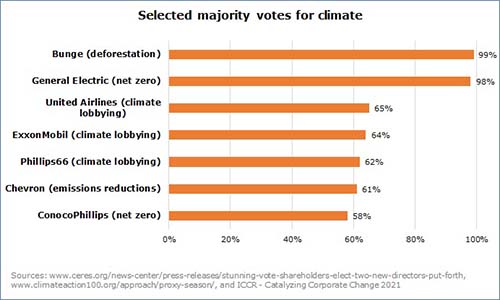As unprecedented heat, fire, flooding and other extreme weather spreads across the globe, the climate crisis is straining and disrupting our systems of modern civilization. The latest assessment report from the Intergovernmental Panel on Climate Change is a disturbing confirmation of our greatest concerns about the growing impact of climate change.

The report states unequivocally that humans have warmed the atmosphere and that this warming has affected weather and climate extremes in every region of the world. Many of the changes occurring now are irreversible. Without a coordinated and expansive effort to deeply and quickly cut emissions, projections are grim.
The votes have it
Fortunately, investors are mobilizing as never before to prioritize climate action. One way this is reflected is through their shareholder votes at company meetings. The 2021 proxy season saw record high votes in favor of climate-related shareholder proposals. Average favorable votes were significantly up all around, and according to Proxy Preview, eight climate change proposals earned majority votes.

The Interfaith Center on Corporate Responsibility (ICCR) reports that its members filed 297 shareholder resolutions on environmental, social, and governance issues at nearly 200 companies, many of which were climate-related. More than 120 went to ballot and received record levels of support. Many of those that didn’t end up on the ballot were withdrawn by the shareholders due to productive conversations with the company, including over half of climate proposals.
Some proxy season highlights include General Electric shareholders voting 98% in favor of the company detailing its net-zero emissions plan across its operations and products, and a majority of ConocoPhillips and Chevron investors approving similar resolutions that seek to significantly cut their firms’ greenhouse gas (GHG) emissions.
Historic change
In perhaps the most shocking example from 2021, ExxonMobil shareholders voted to replace three members of the board of directors with new members who espouse pro-climate and clean energy policies. Long viewed as a climate laggard within responsible investment and non-governmental organization (NGO) circles, the events at ExxonMobil would have been unthinkable even a year ago and demonstrate just how quickly the investor mood has shifted.
How these votes will translate into policy and operational changes has yet to be seen, but historically, this kind of clear investor signal leads to corporate action. By one measure of progress, hundreds of companies – including dozens of energy firms – have made recent commitments to achieve net-zero carbon emissions by 2050 or earlier.
These cases underscore the critical role that conscientious, climate-aware investors can and do play in furthering the low carbon transition, even among the most historically recalcitrant of companies.
The mainstreaming of investor climate concerns is a boon for the earth and doesn’t come a moment too soon. This historic change would not have been possible without a prior generation of shareholder advocates.
Laying the groundwork
For over two decades, a relatively small group of faith-based and socially responsible investors have pursued climate action at hundreds of companies. Investor members of the ICCR and Ceres coalitions have been central to these efforts.
The context was often challenging. Many companies were reluctant to engage on an issue they considered immaterial. With low levels of buy-in from companies and little support from mainstream investors, engagement could feel like yelling into the void.
Yet progress was made, and small victories – and a few large ones – were won. Most importantly, shareholder advocates developed issue expertise, honed relationships, and built mutual trust with companies. This secured the foundation that a broad array of climate-conscious investors are building on today.
Praxis has been a part in these engagement efforts for nearly 20 years and witnessed the transformation of corporations and investors regarding climate awareness and risk management. Now it’s hard to believe that in the recent past, it was an uphill battle to convince many companies and investors that climate change was a material issue and worthy of consideration.
A multiple strategy approach
Praxis Mutual Funds pursues climate action through several impact strategies:
- Shareholder advocacy – we engage companies on their emissions, public policy actions, and plans for the low carbon transition; we collaborate with many other investors in this work and are active members of ICCR, Ceres, and Climate Action 100+.
- Proxy voting – we vote strongly in favor of pro-climate shareholder resolutions and seek to hold boards accountable on their climate leadership.
- Green and sustainable bonds – we invest in high-impact bonds that fund emissions reductions, renewable energy, and climate adaptation.
- Fixed income engagement – our investment managers ask critical questions of bond issuers and advocate for bonds that address climate concerns.
- Community development investing – through our CDI investments, we support sustainable small businesses and climate adaptation.
- Screening – we seek to avoid investing in companies that fail to address their climate risks and are most poorly aligned for a low-carbon future.
Delivering real-world change

For example, we engage with electric utilities to encourage them to cut emissions, transition away from fossil fuels, and add renewable energy capacity. The power sector accounts for 30% of US GHG emissions, much of it from the burning of coal and natural gas. If a coal-heavy utility replaces coal plants with cleaner or renewable energy, it makes a greater impact on the world than an already efficient company getting slightly more efficient. And the utilities we engage are rapidly cutting emissions and setting net-zero targets.
For more Praxis stories of impact, go here.
Work remains – time to seize the momentum
Despite the sea change occurring among investors and companies on climate, there’s no question that our pursuit of true sustainability still falls short. On our current trajectory, warming of both 1.5 and 2 degrees C will be exceeded this century, exacerbating current extreme weather trends. But there is reason for optimism. As the adage goes, when there’s a will, there’s a way. And it’s clear that investors and capital are rapidly aligning behind the low carbon transition. When some of the most powerful forces in the economy combine to send clear signals on climate, anything is possible. It’s time to seize the momentum and push forward.

